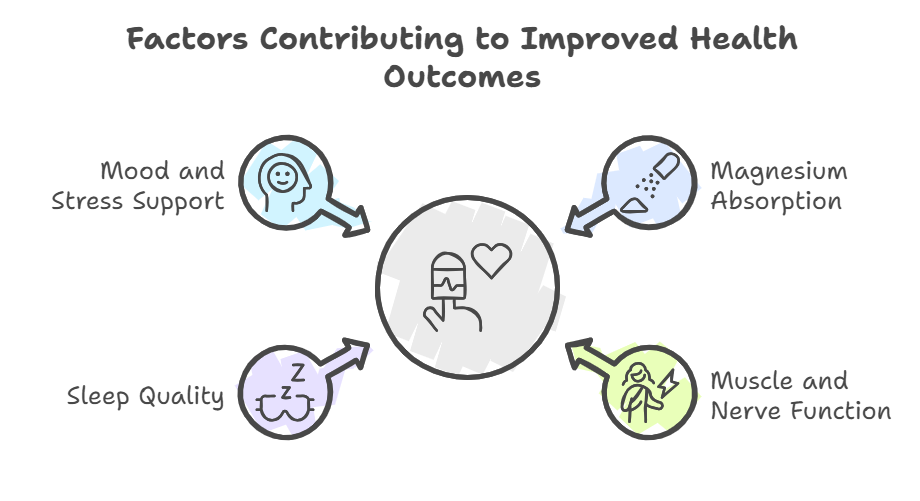Magnesium bisglycinate has emerged as a popular choice in the world of magnesium supplements. It combines magnesium with the amino acid glycine. This combination is believed to improve absorption and minimize digestive issues often linked to other magnesium forms.
Magnesium is essential, participating in over 300 bodily reactions. It’s crucial for bone health and muscle and nerve regulation, acting as a true multitasker. However, many individuals don’t get enough of this vital mineral.
Studies indicate that roughly half of the U.S. population may have a magnesium deficiency. Magnesium bisglycinate helps by offering a highly usable form of magnesium. It’s not just about increasing magnesium intake; it’s about effective utilization.
Understanding Magnesium Bisglycinate
Magnesium bisglycinate, often called magnesium glycinate, combines elemental magnesium with the non-essential amino acid glycine. This specific combination distinguishes it from other magnesium supplements. This form is designed for enhanced absorption.
The main benefit of magnesium bisglycinate comes from its structure. Glycine helps transport magnesium across the intestinal wall more efficiently. This leads to better absorption rates compared to forms like magnesium oxide.
Glycine also helps minimize the laxative effect common with magnesium supplements. This reduces the chances of digestive discomfort when using magnesium bisglycinate. It is much more gentle on the stomach.
Chemical Structure and Properties
The chemical formula for magnesium bisglycinate is C4H8MgN2O4, and its molar mass is 172.423 g/mol. This detail is documented in the PubChem Compound Summary for Magnesium bisglycinate1. Each magnesium ion bonds to two glycine molecules.
This bonding gives magnesium bisglycinate its stability and high bioavailability. It’s well-suited for those looking to maximize magnesium uptake.
The Benefits of Magnesium Bisglycinate
Magnesium bisglycinate provides several health advantages. These are mostly due to its high absorption and gentle impact on digestion. Here are some key benefits:
Improved Magnesium Absorption
Magnesium bisglycinate’s superior absorption is a primary benefit. A study in the *Journal of Nutrients* showed that forms like magnesium bisglycinate positively affect intestinal cells. This might enhance absorption.
Higher absorption ensures more magnesium is available for use by your body. This can be crucial for addressing magnesium deficiencies. It may also lead to better health results overall.
Support for Muscle and Nerve Function
Magnesium is vital for muscle contractions and nerve signal transmission. Magnesium bisglycinate offers an easily absorbable form of magnesium. This may help support these key functions.
Adequate magnesium levels are essential to help prevent muscle issues such as leg cramps. Proper blood pressure is supported by good magnesium intake, making it key for heart health too. Many use magnesium to keep a healthy lifestyle that allows you to stay on track2.
Potential Sleep Benefits
Some individuals report better sleep quality using magnesium bisglycinate before bed. Glycine, a component of this supplement, has been linked to improved sleep. While more research is necessary, early findings are promising.
Getting enough sleep has been linked to preventing disease and improving both mental health and sports performance. Many of the processes in our body happen while sleeping3.
Mood and Stress Support
Magnesium helps produce and regulate neurotransmitters, affecting mood. Supplementing with magnesium may support a positive mood and stress reduction. Supporting mood is an important component of improving your overall mental health.
Managing stress can significantly impact overall well-being. Consistent stress levels can cause all sorts of problems, and finding a natural way to combat stress can greatly improve bone density too.

Magnesium Bisglycinate vs. Other Forms of Magnesium
Different magnesium supplements have varying qualities. Here’s a comparison with other common types:
| Form of Magnesium | Absorption Rate | Potential Side Effects |
|---|---|---|
| Magnesium Bisglycinate | High | Minimal digestive side effects |
| Magnesium Oxide | Low | May cause diarrhea |
| Magnesium Citrate | Moderate | May have a laxative effect |
| Magnesium Chloride | Moderate | May cause digestive upset |
Magnesium bisglycinate is notable for its high absorption and few side effects. It’s ideal for those with digestive sensitivities or those needing to raise magnesium levels quickly. Always consider the different effects that magnesium sources can have.
How to Use Magnesium Bisglycinate
Adding magnesium bisglycinate to your routine is simple, but consider these tips. Here is some additional helpful information about adding magnesium into your daily life:
Dosage
Dosage for magnesium bisglycinate varies with age, sex, and health needs. The Recommended Dietary Allowance (RDA) for magnesium4 is 310-420 mg daily for most adults. This includes all sources, not only supplements.
Magnesium bisglycinate supplements often range from 100-400 mg daily. Start with a lower dose and increase gradually under a healthcare professional’s advice. Always be sure to follow guidelines.
Timing
You can take magnesium bisglycinate anytime. Some prefer it in the evening, especially if used to aid sleep. Consistency can sometimes matter more than time of day.
Potential Interactions
Magnesium bisglycinate can interact with some medications. It may affect the absorption of antibiotics or bisphosphonates for osteoporosis. Check with a healthcare provider before adding any new supplement, particularly if you’re on other medications5.
Proper guidance is vital when using supplements to improve health concerns. If you want shipping updates or stock notifications, look for options when you shop online for retail orders and use the quick order process. Registered customers can do order tracking through their navigation menu.
Potential Side Effects and Precautions
While magnesium bisglycinate typically has fewer side effects than other forms, be aware of potential issues:
Digestive Issues
Some may experience mild digestive discomfort, such as diarrhea or stomach cramps. Though less common, these symptoms can occur. Starting with a small dose can help minimize these effects. If you experience persistent diarrhea, you might find helpful information in this article about diarrhea every morning.
Interactions with Medications
As noted, magnesium bisglycinate can interact with certain medications. Always consult a healthcare provider before use.
Risk of Overdose
Overdosing on magnesium through supplements is possible, though rare. Symptoms can include nausea, diarrhea, and in severe cases, irregular heartbeat and cardiac arrest. Stick to recommended dosages.
Frequently Asked Questions
What is magnesium bisglycinate good for?
Magnesium bisglycinate aids muscle and nerve function, and might enhance sleep. It also supports mood and stress management. Its high absorption helps effectively combat magnesium deficiency.
Which one is better, magnesium citrate or bisglycinate?
Magnesium bisglycinate often is favored for its high absorption and minimal digestive issues. Magnesium citrate may act as a laxative. This effect is helpful for some, but not for others.
Who shouldn’t take magnesium bisglycinate?
Individuals with kidney disease should consult a doctor before using any magnesium, including bisglycinate. Those on medications like antibiotics or osteoporosis drugs should also seek advice. Potential interactions can affect treatment effectiveness.
Conclusion
Magnesium bisglycinate is a well-absorbed and well-tolerated magnesium supplement. Combining magnesium and glycine, it improves muscle and nerve function and promotes better sleep. Those who use it can benefit greatly.
It’s not a panacea, but it’s a useful option for increasing magnesium intake with fewer side effects. Thoughtful use of any supplement is important. Consider your personal health needs, seek professional advice, and start with low doses.
Supplements support but do not replace a balanced diet and healthy habits. The choice to use magnesium bisglycinate depends on your health profile and objectives. Knowing its benefits, risks, and correct use helps in making a smart choice for your wellness.
For any questions on our manufacturing process or for our professional tools please see our website. Also see our wellness guides, health quizzes, NSF Certified supplements, and certified supplements. Explore the work we do with our Thorne partners, Thorne ambassadors, and Thorne advisor.
If you have an iOS app, you can shop online for the supplements. Enjoy free ground shipping by ordering today and signing up for our Thorne emails. Read our terms privacy proposition on our site, as well as our California privacy notice. Contact us for support if you are military/first responder or have any other concerns like learning more about sensitive personal information.
Small Step, Big Impact
If you’re considering magnesium bisglycinate supplementation, consult with a healthcare professional to determine the appropriate dosage for your needs. Start with a lower dose to assess tolerance, and monitor for any adverse effects.
Listen to this article
This is an AI generated Podcast version of the article.
- https://pubchem.ncbi.nlm.nih.gov/compound/Magnesium-bisglycinate[↩]
- https://www.webmd.com/diet/supplement-guide-magnesium[↩]
- https://www.sleepfoundation.org/physical-activity/athletic-performance-and-sleep[↩]
- https://ods.od.nih.gov/factsheets/Magnesium-HealthProfessional[↩]
- https://ods.od.nih.gov/factsheets/Magnesium-HealthProfessional/[↩]



